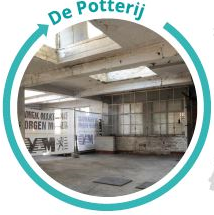Circular City Governance in Mechelen
De Potterij in the Flemish city of Mechelen was an abandoned polluted site. Now it is set to become a circular economy incubator where young, innovative entrepreneurs can meet up with like-minded people - a site for circular economy business and social initiatives. It will also host a large supporting network for researchers, government and experts to make their circular economy ambitions a reality.
The city of Mechelen got involved when the Flemish Public Waste Agency started to work on the site in 2010, tackling the soil and water pollution resulting from former laundry activities. Together with Circular Flanders, the city's social, economic and environmental departments, the Thomas Moore University of Applied Sciences, companies and citizens, the idea was developed of creating a circular hub at this central location.
At De Potterij, the focus is on maximising the reuse of products and raw materials and on minimising the loss of their value. Its work will also extend to other areas, such as ecology, urban planning, education, the local neighbourhood and culture, while providing opportunities to meet new people.
Outcomes and opportunities
1. Different governmental levels (regional and local) worked together to create a new point of attraction in the city.
2. Local legislation has been adapted to promote the concept of a circular business hub.
3. A library for tools was one of the first users of De Potterij.
4. A workshop was organised to identify citizens' main needs and, working with experts, to come up with circular solutions to these challenges.
5. Next to circular economy, the project connects to other social needs such as urban agriculture, jobs, cutting pollution, etc. Combining different challenges can strengthen a project.
6. Urban development is a strong catalyst for innovating a city when different stakeholders are involved. One solution can lead to another.

